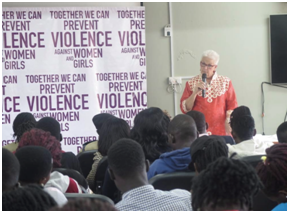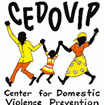
MUK DIVA SAFETY CAMPAIGNS: THE JOURNEY OF MAKERERE UNVIERSITY RESPONSE TO SEXUAL HARRASSMENT!
CEDOVIP launched its work with Institutions of higher learning specifically in Makerere and Kyambogo Universities with the aim of creating an enabling environment to prevent VAW/G among young people in higher institutions of learning and in the communities Initially, CEDOVIP undertook an asset mapping that uncovered that sexual harassment is a huge issue impacting young women in the Makerere University community. Asset mappingand conversations with students and staff showed that sexual harassment is incredibly prevalent on the University campus, despite the fear and stigma surrounding discussing the situation. The University’s response to this critical issue has been virtually non-existent, as the current sexual harassment policy is, for the most part, unknown to the public and not being effectively implemented. Furthermore, the resources meant to be in place for handling survivors of sexual harassment, assault and rape were found to be greatly failing. Almost all University Committees that were supposed to have been organized, as per the 2006 Sexual Harassment Policy, to manage sexual harassment cases were nonexistent. Worse still, it is alleged that the only Committee that was ever organized, had some members who were suspected to be sexual harassers.Furthermore, the University hospital workers and University police were said to be insensitive and unhelpful towards survivors of sexual harassment and assault. However, there are other relevant concerns regarding the University’s physical infrastructure, specifically the lack of adequate lighting and security which makes the University campus environment conducive to sexual harassment and assault. Given the alarming situation at Makerere, CEDOVIP decided to take action!“CEDOVIP’s entry point was the School of Women and Gender Studies to recruit a group of forty dedicated student activists; half men, half women, committed to challenging the culture of violence against women on Makerere’s University Campus. For the past two years, these student activists have been working hard to raise awareness about issues of violence against women and sexual harassment. They have held public events, including the MUK Diva Safety Campaign, with the intention of building a student movement against the dominant culture of violence and harassment. CEDOVIP has embarked on orienting fresh first year students about the University’s sexual Harassment Policy and how to prevent sexual harassment”, said Ann Nassamula program officer at CEDOVIP. Additionally, the University Activists and CEDOVIP have engaged with the university administration to discuss the gaps in the current Sexual Harassment Policy. This wave of activism helped to spark a series of actions on the part of the University. Last month, a Committee appointed by Vice Chancellor Prof. Barnabas Nawangwe and headed by Prof. Sylvia Tamale dedicated to investigating sexual harassment at Makerere University released their final report. Although the university has had an anti-sexual harassment policy in place since 2006, the issue of sexual harassment and assault at the university remains unchecked, with many cases never being reported due to lack of awareness, stigma and a deficit of appropriate reporting mechanisms. Even those few cases that get reported are often never dealt with appropriately, mainly due to the fact that the reporting and case handling mechanisms are flawed. CEDOVIP’s Diva safety campaigns during the 2017 Annual 16 Days of Activism Campaign against violence against women saw the US Ambassador to Uganda H.E Deborah R. Malac join the call for the students to speak out against sexual harassment (http://www.cedovip.org/index.php/news-events/latest-news/131-us-ambassador-challenges-makerere-university-students-to-speak-out-on-vaw-g) and prompted the University leadership to make commitments to address the vice. Recently, the magnitude of sexual harassment at Makerere University came into the spotlight due to student activism and increased media attention to specific high-profile cases. Following the commitment from the University leadership, action from CEDOVIP and other actors, the university instituted a Committee to investigate the cause of increased occurrences of sexual harassment at the university, make recommendations for the improvement of the current Sexual Harassment Policy, and receiving submissions on sexual harassment at the university. According to the report, the Committee gathered their information straight from the source by interviewing 234 members of the university community. Interviewees included principals, Deans, Academic and Administrative Staff, students from the ten colleges and the main administrative units of the university. As the committee recognized that sexual harassment is an issue that primarily affects women, 59% of interviewees were female. The Committee identified the main factors leading to sexual harassment at Makerere University and made policy recommendations to best address theproblem. “One of the core social factors found to lead to sexual harassment was power imbalance between men and women and intimate partner relationships, and that men hold the majority of positions of power at the university. In fact, the total percentage of women in leadership positions at Makerere University is only 26%, and the majority of people holding administrative and managerial authority are men. This imbalance of power causes most female students and employees to be dependent on men for the advancement of their academic and professional careers.When this power imbalance is coupled with the patriarchal social structure of the university, which perceives women as sexual objects, a culture conducive to sexual harassment and assault is created” reads part of the report. Currently the University has undertaken efforts to implement the report’s recommendations and has incorporated sexual harassment prevention and response mechanisms into the University’s strategic plan. CEDOVIP has intensified its programs with the university to ensure that the plans are implemented to create safe spaces for the students to report cases of sexual harassment, access to justice as well as support the review of the Anti Sexual Harassment Policy to ensure its survivor centered and adheres to internationally acceptable standards and guidelines in addressing violence against women and girls.
